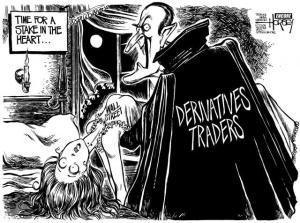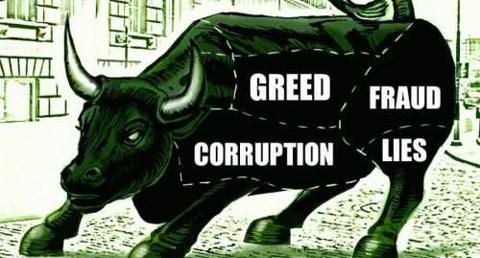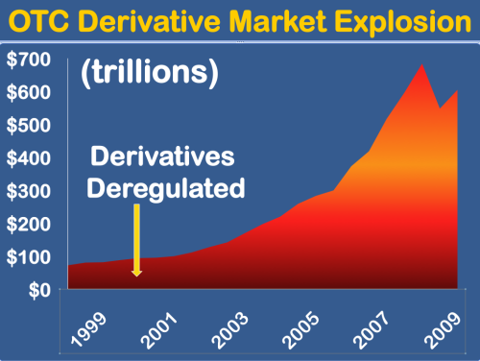After two years and two months of investigations the EU commission have reached a preliminary conclusion: 13 major banks cooperated with theInternational Swaps and Derivatives Association (ISDA) and data service provider Markit to prevent credit derivatives from being traded on public exchanges so they could maintain their lucrative income from the unregulated €10 Trillion
over-the-counter (OTC) market."Over-the-counter trading is not only more expensive for investors thanexchange trading, it is also prone to systemic risks."
"If, after the parties have exercised their rights of defence, theCommission concludes that there is sufficient evidence of an infringement, it can issue a decision prohibiting the conduct and impose a fine of up to 10% of a company's annual worldwide turnover," the EU commission says in a press release.
The European Commission has informed some of the world's largest  investment banks of its preliminary conclusion that they infringed EU antitrust rules that prohibit anti-competitive agreements by colluding to prevent exchanges from entering the credit derivatives business between 2006 and 2009, according to a press release dated July 1.
investment banks of its preliminary conclusion that they infringed EU antitrust rules that prohibit anti-competitive agreements by colluding to prevent exchanges from entering the credit derivatives business between 2006 and 2009, according to a press release dated July 1.
However, sending a letter of objections to the banks on institutions involved does not prejudge the final outcome of the investigation, the commission adds.
"Between 2006 and 2009, Deutsche Börse and the Chicago Mercantile Exchange tried to enter the credit derivatives business. The exchanges turned to ISDA and Markit to obtain necessary licenses for data and index benchmarks, but, according to the preliminary findings of the Commission, the banks controlling these bodies instructed them to license only for "over-the-counter" (OTC) trading purposes and not for exchange trading. Several of the investment banks also sought to shut out exchanges in other ways, for example by coordinating the choice of their preferred clearing house."
"The Commission takes the preliminary view that the banks acted collectively to shut out exchanges from the market because they feared that exchange trading would have reduced their revenues from acting as intermediaries in the OTC market."
Adding Fuel to the Fire
 The main components of the credit derivative market is the CDO's (Collateralized Debt Obligation) and the Credit Default Swaps(CDS).
The main components of the credit derivative market is the CDO's (Collateralized Debt Obligation) and the Credit Default Swaps(CDS).
The swaps have caused substantial volatility in the financial markets over the last years as these derivatives, used to hedge national public debt obligations, has caused significant additional costs to troubled countries like Greece, Spain, Ireland and Italy.
The following 13 financial institutions are suspected of violating article 101 of the Treaty on the Functioning of the European Union (TFEU) that prohibits anti-competitive agreements.
- Bank of America, Merrill Lynch
- Barclays
- Bear Stearns
- BNP Paribas
- Citigroup
- Credit Suisse
- Deutsche Bank
- Goldman Sachs
- HSBC
- JP Morgan
- Morgan Stanley
- Royal Bank of Scotland
- UBS
Additionally, the International Swaps and Derivatives Association (ISDA) and data service provider Markit are suspected to have participated in the rigging of the huge credit derivative market with an estimated size of ten times the global GDP.
"It would be unacceptable if banks collectively blocked exchanges to protect their revenues from over-the-counter trading of credit derivatives. Over-the-counter trading is not only more expensive for investors than exchange trading, it is also prone to systemic risks," commission Vice President in charge of competition policy, Joaquín Almunia, says in the statement.
The EU says it will prohibit the banks from this kind of trading, and/or impose a fine of up to 10% of their annual global revenue, if the allegations are true.
 Of course it's true. The list of banks above are the same banks suspected, charged and convicted of a series of market violations over the last five years - from lying to investors about their risk exposure, to manipulation of asset prices and fixing interest rates.
Of course it's true. The list of banks above are the same banks suspected, charged and convicted of a series of market violations over the last five years - from lying to investors about their risk exposure, to manipulation of asset prices and fixing interest rates.
But they will - of course - fight this allegations, too, to the bitter end, seeking to haul out the case as long as possible and eventually agree on a settlement with the EU commission excepting an insignificant fine and another little slap on the wrist.
Case closed. Se you next time around!
- EU To Investigate CDS Manipulation by Major Banks
- Markit Statement on European Commission CDS Inquiry
- Civil And Criminal Probes Against JP Morgan For Silver Manipulation
- SEC To Take Action Against Moody's
- Too Big To Jail
- Goldman Sachs Charged With Fraud - Here's The SEC filing
- Goldman's Collateralized, Securitized And Synthesized Fraud
- Banks Face Multi-Hundred-Million Dollar Settlements
- The Truth, Some Truth And Something Like The Truth
- U.S. Stock Crash Compels Further Investigation of Wall Street Scam
- DnB NOR Except Penalties of NOK 26 million
- You Sue Me, I Sue You, Oh Peggy, Peggy Sue
- 6 US Banks Collects 93% Of Industry's Trading Revenue
- Derivative Trading Just Keeps Getting Bigger
- JPMorgan's "Poison Pill" Strategy
- Italy Charge Foreign Banks With Fraud
- Where Exactly Is "Money Heaven"?
- Former Goldman Sachs Banker Become New ECB President


